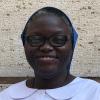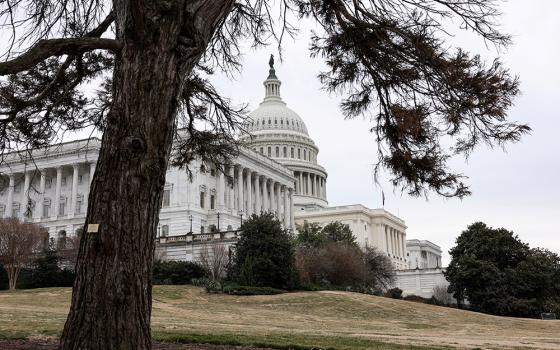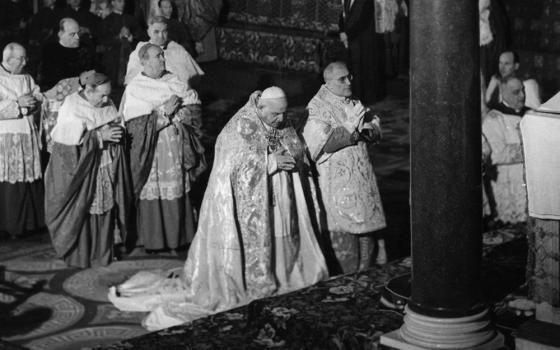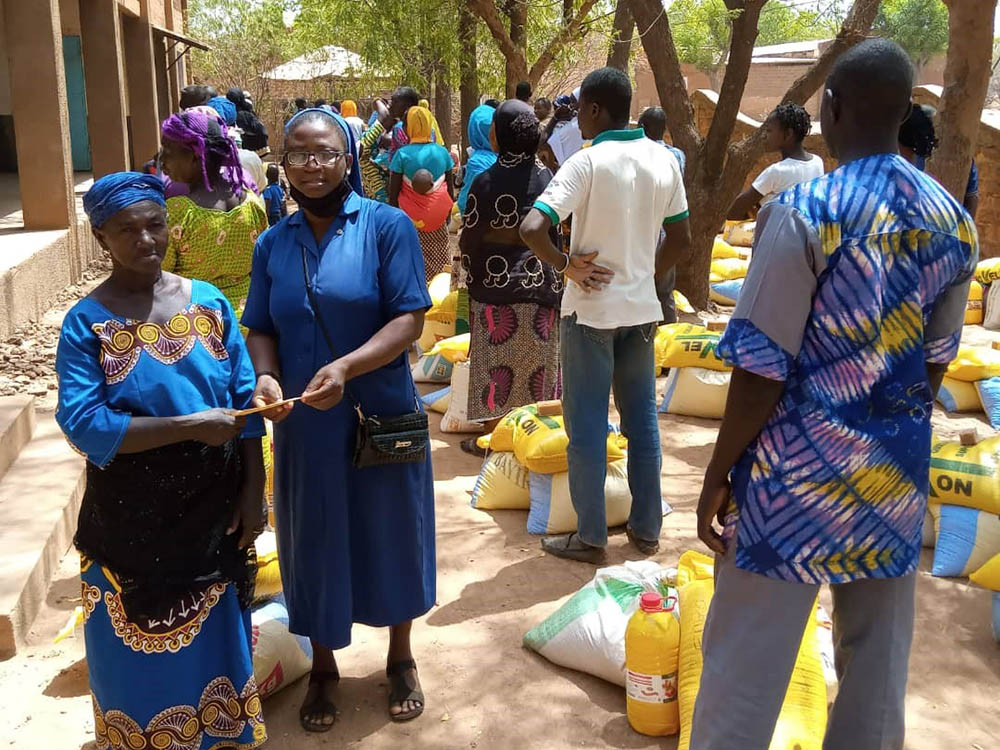
Sr. Ojonoka Acheneje, a Daughter of Charity of St. Vincent De Paul, distributes food to internally displaced persons in the Diocese of Nouna, Burkina Faso. (Courtesy of Janet E. Deinanaghan)
Burkina Faso is a landlocked country bounded by Mali, Niger, Benin, Côte d'Ivoire and Ghana. The country obtained its independence in 1960 from France and was then known as Upper Volta. The name Burkina Faso — which means "Land of Incorruptible People" — was adopted in 1984. The capital, Ouagadougou, is in the center of the country.
Burkina Faso is a predominantly Muslim country (61%), with 19% Catholic, 15% following traditional religions, 4% Protestant and about 1% nonreligious. The seat of the Roman Catholic archbishopric is in Ouagadougou, and there are several bishoprics throughout the country.
I am a Daughter of Charity of St. Vincent De Paul, missioned to Burkina Faso in 2017 to work in the Nouna Diocese as an English language teacher. After three months of an intensive French language course in Togo — because I am from Nigeria and knew no French — I arrived on Nov. 28. I was sent to teach English language in our new inclusive school that had just opened in October that year.
I had a mixed feeling of fear and excitement, going to a different country and learning a new culture and way of life totally different from what I was used to in Nigeria. The good thing was that another of my sisters, Sr. Ojonoka Acheneje, was sent to the same school — I to teach and she as bursar — which made the experience more agreeable.
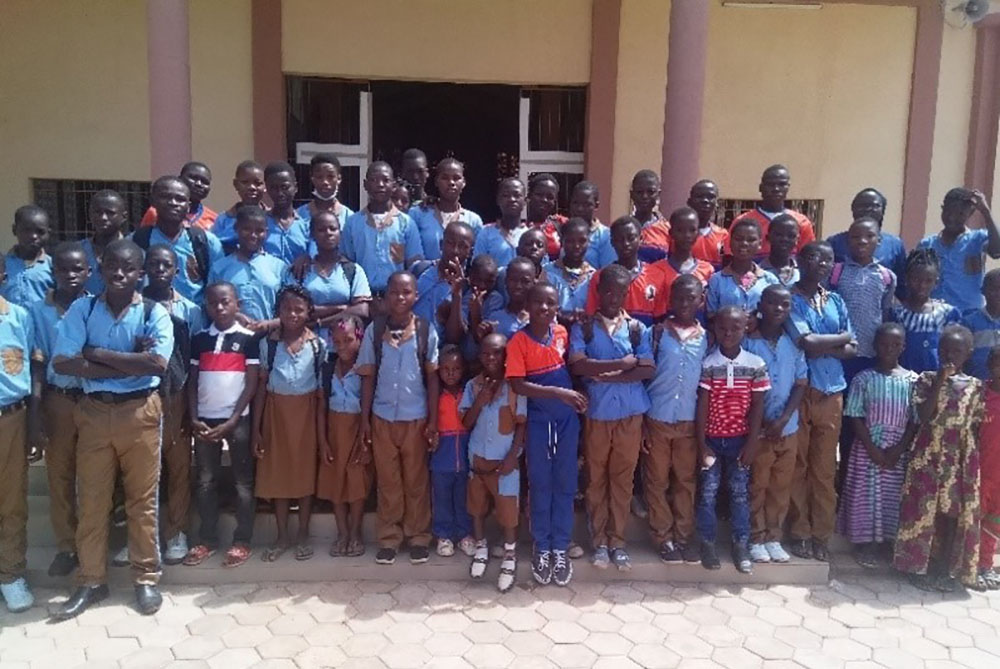
Students of the Daughters of Charity's inclusive school in the Diocese of Nouna, Burkina Faso, pose for a photo after the opening Mass for the new academic session. (Courtesy of Janet E. Deinanaghan)
My first surprise in arriving in Burkina Faso as a missionary was the free spirit and simplicity of the people there. Coming from a background in Nigeria where Christianity has become a "badge" people wear around like the scribes and Pharisees of Jesus' days did, I was profoundly struck with the simplicity of faith practiced among the people here.
To top it all off, I realized that it wasn't taboo for a Christian to invite a Muslim relation or friend to attend a function in our church, and vice versa! In fact, it is not a taboo for a Christian woman to be married to a Muslim — she can still live her faith fully as a Catholic or other Christian. Many of the staff members of our school are married to a Christian or a Muslim person.
One day, I went on a home visitation in the village with one of my sisters, and we entered the home of a Catholic family. We saw the younger daughter of the family praying outside on her mat. She was a Muslim while her elder sister — whom we were visiting — was sitting nearby praying her rosary. It was such a beautiful and evangelizing sight for me. And our friend said that's how they have been practicing their faith in the family, without any trouble.
The bank manager of the local Ecobank is married to a Catholic, while he himself is a Muslim. He said he loves the Catholic church and her songs, and that he has no problem with his wife practicing her faith. He further added that in moments of need, he books a Mass for his private intentions and attends when he has the time. His wife, too, goes to the mosque with him whenever she can.
Advertisement
There are so many other families like these in Burkina Faso — where siblings have different faith beliefs, yet they live together amicably. We hear of siblings from both Muslim and Christian backgrounds celebrating a burial ceremony for their late parents in the same compound, and all goes well. I have had the privilege of being invited by Muslim friends for either a marriage ceremony or the Ramadan celebration in their homes, and I found it very evangelizing.
That is why I agree with the words of Pope Francis in addressing the attendees of the John 17 Movement gathering, where he stated, "Division is the work of the father of lies." Therefore, he said, we should live as one, since we are all brothers and sisters, and disciples of Christ.
Our community arrived in the Nouna Diocese on Aug. 5, 2009, with the first three sisters — Felicia Ezeimo, Esther Ekpo and Toyin Abegunde — who had come to teach, tend the sick and do social work. These were the specific areas of need presented to the Daughters of Charity in Nigeria for which the sisters were sent to work.
The sisters arrived with joy; though they started with nothing on the ground, they worked so hard that after eight years of toil, they identified the need to start a second local community, to run an inclusive school for children with disabilities since in the process of their field work in the villages they had identified many who needed those services.
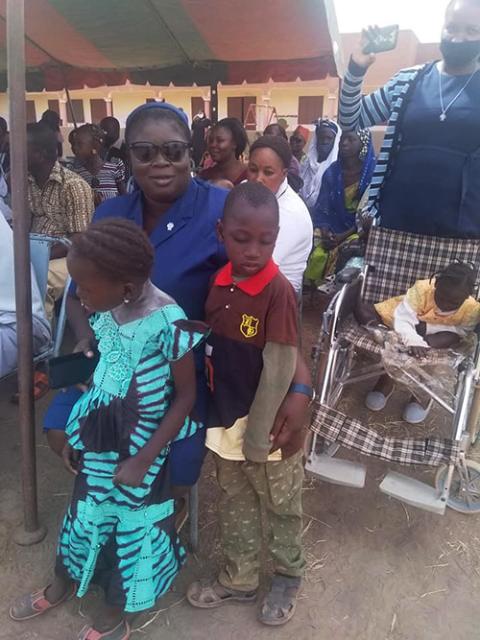
Sr. Janet Deinanaghan with special children at the end-of-year party for the Daughters of Charity's inclusive school in the Diocese of Nouna, Burkina Faso (Courtesy of Janet E. Deinanaghan)
This gave birth to the new inclusive school that we now have in the diocese. It started with 68 students in 2017 and has now grown to 3,014 in 2022 — out of which 70 are children with special needs, such as autism, Down syndrome, physical handicaps and hearing impairment. Seven Daughters of Charity live and work in two communities in this diocese, in the following ministries: education, social, pastoral and prison apostolates.
However, only one Burkinabe has joined us so far, a young girl from a Catholic family — Amandine Ouedraogo — who is doing her postulant formation in Nigeria now. But in the Province of Algeria there is a Daughter of Charity from Burkina Faso, Sister Georgette, who joined us before the arrival of the sisters from Nigeria. We pray and hope that many other girls will join us in the service of the poor here.
This beautiful way of life is being destroyed by the upsurge of fanatics now in Burkina Faso who want the world under their control and want no other religion except theirs. This is not the intention of God, who gave us freedom to practice whatever religion we wish to practice if it helps us to love him and our neighbors more. They claim Western education is bad and that only Arabic should be taught in schools!
This is the reason we have had several attacks and schools burned in the country. We were attacked on Nov. 22, 2021, and have been displaced ourselves. The school has been temporarily closed but we managed to get some abandoned buildings to continue teaching here.
Life has changed for all of us recently and it is not easy, but we thank God who protected us and kept us safe. Things seem bleak for now, but the government is gradually trying to quell the insurgents, even as the church prays for peace to reign.
